Related Research Articles

The Armed Forces of the Philippines (AFP) are the military forces of the Philippines. It consists of three main service branches; the Army, the Air Force, and the Navy. The President of the Philippines is the Commander-in-Chief of the AFP and forms military policy with the Department of National Defense, an executive department acting as the principal organ by which military policy is carried out, while the Chief of Staff of the Armed Forces of the Philippines serves as the overall commander and the highest-ranking officer in the AFP.
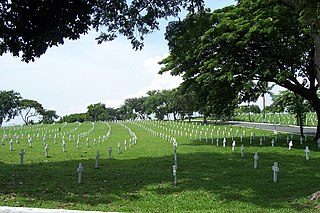
Libingan ng mga Bayani is a national cemetery within Fort Bonifacio in Barangay Western Bicutan, Taguig, Philippines.

The Philippine Navy (PN) is the naval warfare service branch of the Armed Forces of the Philippines. It has an estimated strength of 24,500 active service personnel, including the 10,300-strong Philippine Marine Corps. It operates 90 combat vessels, 16 auxiliary vessels, 25 manned aircraft and 8 unmanned aerial vehicles. Tracing its roots from the Philippine Revolutionary Navy on May 20, 1898, while its modern foundations were created during the creation of the Offshore Patrol on February 9, 1939, the PN is currently responsible for naval warfare operations and maritime patrol missions within the Philippine Waters, as well as ensuring the protection of the Philippine's maritime interests, including the West Philippine Sea and Benham Rise.

Palayan, officially the City of Palayan, is a 5th class component city and capital of the province of Nueva Ecija, Philippines. According to the 2020 census, it has a population of 45,383 people, making it the least populated city in the Philippines.
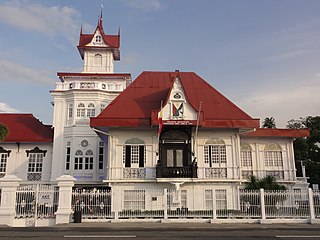
Independence Day is a national holiday in the Philippines observed annually on June 12, commemorating the declaration of Philippine independence from Spain in 1898. Since 1978, it has been the country's National Day.
On July 27, 2003, the Oakwood mutiny was staged by a group of about 300 armed defectors from the Armed Forces of the Philippines (AFP) and the Philippine National Police (PNP) led by Army Capt. Gerardo Gambala and Navy Lt. Senior Grade Antonio Trillanes IV against the Arroyo administration. The group forcibly seized and occupied Oakwood Premier in Glorietta, Makati for almost 20 hours. They expressed grievances against the government's supervision of the military, and demanded the resignation of Defense Secretary Angelo Reyes, PNP Director General Hermogenes Ebdane, and AFP Chief of Intelligence Service Victor Corpus; They also aired their grievances against the military establishment and anomalies on the AFP. The mutiny was covered heavily by the local press, who dubbed the group as "Magdalo" in reference to their insignia, which alludes to the Magdalo faction during the Philippine Revolution, despite the group officially calling themselves "Bagong Katipuneros". The mutiny ended after the government successfully negotiated with the group. Several prominent participants of the mutiny, including Trillanes and Gambala, were later charged.
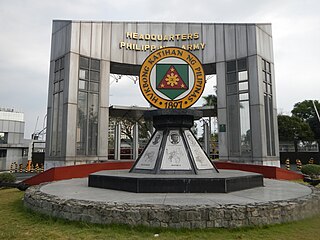
Fort Andres Bonifacio is the site of the national headquarters of the Philippine Army located in Taguig City, Philippines. The camp is named after Andres Bonifacio, the revolutionary leader of the Katipunan during the Philippine Revolution.
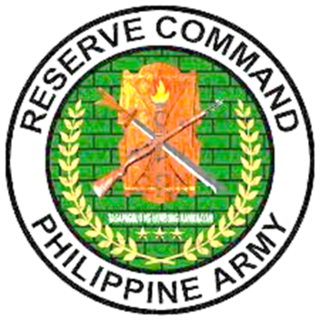
The Reserve Command is a major support command of the Philippine Army. It was created for the sole purpose of reserve force management, organization and Government Arsenal procurement.
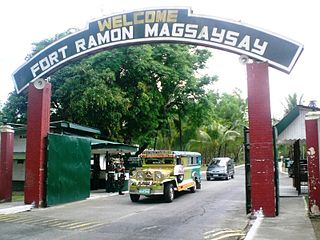
Fort Ramon Magsaysay, also known as Fort Magsaysay Military Reservation (FMMR) and Fort Mag, is the largest military reservation in the Philippines, and is a key training area of the Philippine Armed Forces. Fort Magsaysay straddles the provinces of Nueva Ecija and Aurora, encompassing Palayan City, Sta. Rosa, Gen. Tinio, Laur, and Dingalan.

The Chief of Staff of the Armed Forces of the Philippines (CSAFP) is the highest-ranking military officer and the head of the Armed Forces of the Philippines (AFP), including all service branches under its command. The position is usually held by a four-star rank of General or Admiral. Its direct equivalent in the US Armed Forces is the Chairman of the Joint Chiefs of Staff. Unlike its US counterpart, which is merely supervisory, the Chief of Staff has complete operational control within the military hierarchy and is responsible for the overall operations of the AFP.

Upper Bicutan is one of the 38 barangays of Taguig, Metro Manila in the Philippines.
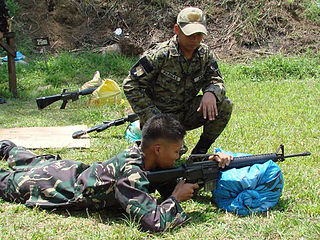
Reserve Officers' Training Corps (ROTC) in the Philippines is one of three components of the National Service Training Program, the civic education and defense preparedness program for Filipino college students. ROTC aims to provide military education and training for students to mobilize them for national defense preparedness. Its specific objectives include preparation of college students for service in the Armed Forces of the Philippines in the event of an emergency and their training to become reservists and potential commissioned officers of the AFP.

Eduardo Manahan Año is a Filipino public official and retired general of the Philippine Army who currently serves as the National Security Adviser under the administration of President Bongbong Marcos since 2023. He previously served as Secretary of the Interior and Local Government in the Cabinet of President Rodrigo Duterte from 2018 to 2022, the Chief of Staff of the Armed Forces of the Philippines from 2016 to 2017, and the Commanding General of the Philippine Army from 2015 to 2016. At the onset of the COVID-19 pandemic in the Philippines, Año, along with the rest of the Philippine government's Cabinet Secretaries, became part of the Inter-Agency Task Force for the Management of Emerging Infectious Diseases, a task force formed to advise the President on the strategies which would effectively manage the spread of COVID-19 in the country.

Maharlika Village, officially Barangay Maharlika and simply known as Maharlika, is one of the 38 barangays of Taguig, Metro Manila, Philippines. As of the 2020 census, the population was 23,470. The barangay, which was created from the land that was excluded out of AFP Enlisted Men's Village on January 3, 1974, has the largest Muslim community in Metro Manila.

Central Signal Village, officially Barangay Central Signal Village and simply known as Central Signal, is one of the 38 barangays of Taguig, Metro Manila, Philippines. As of the 2020 census, the population was 44,126. The barangay was previously known as EM's Signal Barrio on January 25, 1965, and was created as Signal Village in 1972, before it was renamed on December 28, 2008.

Bartolome Vicente "Bob" Orpilla Bacarro is a retired Philippine Army lieutenant general who served as the 58th chief of staff of the Armed Forces of the Philippines from 2022 to 2023. He previously commanded the Southern Luzon Command. In 1991, Bacarro was awarded the Armed Forces of the Philippines Medal of Valor for his actions against the New People's Army in Maconacon, Isabela.

Eduardo "Ed" Drueco del Rosario is a Philippine Army veteran and government official who served as the first Secretary of Human Settlements and Urban Development of the Philippines under the Duterte administration, from January 2, 2020 to June 30, 2022. He previously served as Chairperson of the now-defunct Housing and Urban Development Coordinating Council which was abolished and replaced by the Department of Human Settlements and Urban Development created through Republic Act No. 11201 on February 14, 2019. Del Rosario served 37 years in the Armed Forces of the Philippines, retiring as a major general in 2012. His service included tours as commander of the AFP Southern Luzon Command and of the 2nd Infantry Division.
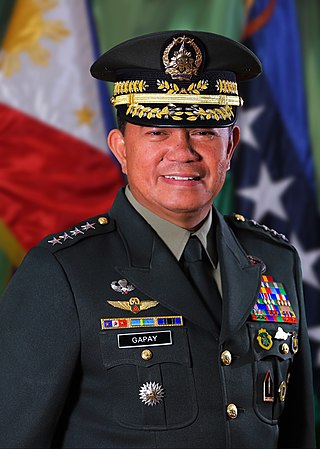
Gilbert Italia Gapay is a retired Philippine Army general who served as the 54th Chief of Staff of the Armed Forces of the Philippines. Prior to his appointment, he served as the 61st Chief of the Army and the commander of the Armor "Pambato" Division.

Camp General Servillano S. Aquino is a military base in Tarlac City, Philippines.

The Enlisted Men's Barrio commonly known as EMBO refers to the collective term for ten barangays in Taguig, Philippines. It is made up of barangays Cembo, Comembo, East Rembo, Pembo, Pitogo, Rizal, South Cembo and West Rembo, as well as the two Inner Fort barangays: Post Proper Northside and Post Proper Southside. The barangays were originally established to house military personnel of the Armed Forces of the Philippines (AFP).
References
- ↑ Besa, Mike; Philippine Navy Golf Club: The Goldilocks of Philippine military golf (July 6, 2019). "Philippine Navy Golf Club: The Goldilocks of Philippine military golf | Mike Besa". BusinessMirror.
- 1 2 3 4 San Juan, Joel (November 2, 2020). "SC kicks out Navy golf course". BusinessMirror. Retrieved November 3, 2020.
- ↑ "Proclamation No. 461, s. 1965". Official Gazette of the Republic of the Philippines. September 29, 1965. Retrieved November 3, 2020.
- ↑ Panaligan, Rey (November 2, 2020). "Land in Fort Boni for AFP Officers' Village can't be used for Navy golf course, SC rules". Manila Bulletin. Retrieved November 3, 2020.
